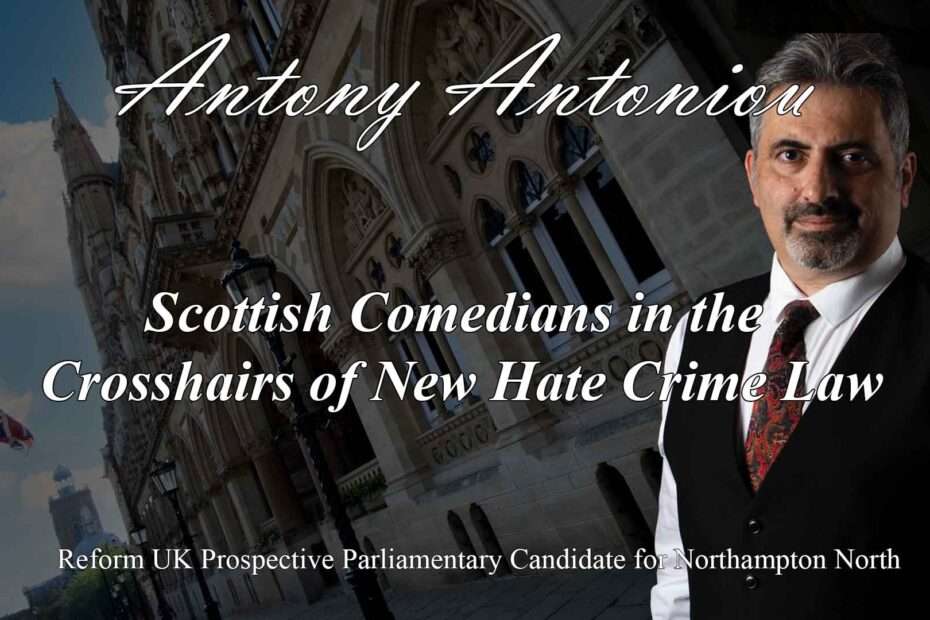Scottish Comedians in the Crosshairs of New Hate Crime Law
Glasgow, Scotland – In a move that has sparked widespread concern for free speech, Police Scotland has been instructed to keep a watchful eye on comedians and performers under the country’s controversial new hate crime legislation. The revelation, reported by The Herald newspaper, has shed light on the training materials being used to guide officers in the enforcement of the Hate Crime and Public Order (Scotland) Act, which comes into effect on 1st April.
The timing of the law’s introduction, coinciding with April Fool’s Day – a occasion traditionally marked by laughter and mirth – has not gone unnoticed. There are fears that, rather than inspiring chuckles, this year’s celebrations may be muted by an air of caution and restraint amongst Scotland’s renowned comedic talent.
At the heart of the consternation lies the Hate Crime Act’s potential to stifle artistic expression and open discourse. The legislation, which has been contentious since its conception under former Justice Secretary Humza Yousaf, now First Minister, has raised alarms that it could be weaponised to steer the gender ideology debate in a particular direction.
The prospect of comedians being targeted for their material has struck a chord in a nation renowned for its vibrant comedy scene and revered funnymen, such as Frankie Boyle, Kevin Bridges, and the inimitable Glaswegian, Limmy. The iconic Stand Comedy Club in Glasgow, a veritable institution that has hosted countless comedic legends throughout their careers, now finds itself at the epicentre of this burgeoning controversy.
As Tony Maguire, GB News’ Scotland reporter, remarked outside the hallowed venue, “Scotland has some of those comedians like Frankie Boyle, Kevin Bridges, and of course our own Limmy. It’s very much a case of let’s wait and see who’s laughing on the 1st of April.”
The Hate Crime Act’s potential reach extends beyond the realm of comedy, with implications for a wide range of performers and artistic endeavours. Its provisions encompass offences such as “misgendering” individuals, a transgression that has already prompted defiance from high-profile figures like acclaimed author J.K. Rowling, who has vowed to deliberately flout the law to test its boundaries.
Maguire encapsulated the gravity of the situation, stating, “It seems that maybe for the first time, it’s going to be rather some cautious laughter this year.”
The concerns surrounding the Hate Crime Act are not limited to the potential curtailment of comedic expression. Critics have raised broader fears about its potential to impinge upon free speech more generally, with some perceiving it as a draconian measure that could have far-reaching consequences for public discourse in Scotland.
Supporters of the legislation, however, argue that it is a necessary step in combating hate speech and promoting inclusivity within Scottish society. They contend that the law provides a framework for protecting vulnerable groups from targeted harassment and discrimination, while still allowing for robust debate and artistic expression within reasonable bounds.
As the 1st of April looms, a date synonymous with mirth and tomfoolery, the spectre of the Hate Crime Act casts a long shadow over Scotland’s comedy scene. Performers and audiences alike find themselves navigating uncharted territory, where the boundaries between acceptable humour and potentially criminal speech remain ambiguous.
In this climate of uncertainty, the once-raucous laughter that echoed through the hallowed halls of venues like The Stand may give way to a more muted, cautious chuckle – a disquieting prospect for a nation that has long prided itself on its irreverent wit and satirical prowess.
As the curtain rises on this new era of regulated speech, all eyes will be on Scotland’s comedians and performers, who now find themselves thrust into the unlikely role of free speech vanguards. Their ability to navigate the

